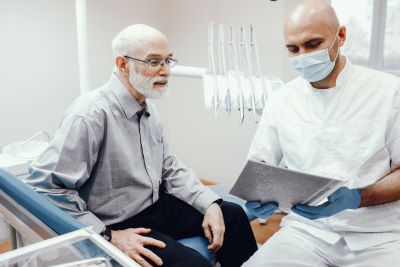Enter your email to receive the CareQuest newsletter:
May 30, 2024
More and more baby boomers turn 65 every day, the magic age of Medicare eligibility. Recent estimates predict that 95 million seniors and people with disabilities will count on Medicare for their health insurance by 2060.
But gaps in oral health coverage and care delivery for people enrolled in Medicare suggest the nation may not be ready to meet their needs — millions of adults who use Medicare lack adequate dental coverage.
The program still excludes routine dental care as a standard benefit, and coverage varies in Medicare Advantage plans.
Oral health coverage opens a critical door to timely care. Without access to care, adults face far-reaching health and economic consequences. Existing dental problems and medical conditions can worsen, becoming more dangerous and expensive to treat.
Improving access to care is also a matter of health equity. These consequences most harm seniors of color, those in rural communities, and others.
Policymakers, health care leaders, and advocates can bring needed relief to Medicare-enrolled adults by advancing solutions to this deep-rooted challenge. Strengthening coverage and adopting medical-dental integration (MDI) are opportunities to promote equity, reduce costs, and improve older adults’ well-being — today and in the future.
The Importance of Dental Care for the Elderly
At every stage of our lives, oral health is connected to our overall health. It’s especially important for older adults because the risk of dental concerns increases with age.
In addition, over half of seniors live with at least two chronic conditions, such as high blood pressure and diabetes. Poor oral health can make these illnesses harder to manage.

Dental problems can also increase the risk of other serious health challenges:
- Adults with fewer teeth are more likely to develop memory loss, Alzheimer’s disease, and greater overall disability.
- Seniors with dental disease are at higher risk of cancer, including of the mouth, breast, and prostate.
- Poor dental health is also tied to pneumonia and cardiovascular disease, risks that grow with age.
Many of these illnesses disproportionately hurt seniors of color, adults with low incomes, and people in rural areas. They face steeper barriers to dental care than their peers.
The good news is that using dental care can decrease these harms as we age:
- Among middle-aged adults, non-invasive treatment for gum disease is tied to a reduced risk for heart disease.
- Elderly adults between 75 and 80 years old were less likely to develop dementia upon receiving five or more treatments for gum disease.
Unfortunately, access to care remains elusive for too many. Lacking dental coverage when they’re most at risk of illness, seniors now face a spike in unmet dental needs.
The Gaps in Access to Oral Health Care
While many adults have dental insurance through their job or union, many older adults don’t have that option.

A 2023 nationwide study from CareQuest Institute revealed the extent of gaps in dental coverage among seniors:
- Adults aged 60 and older are more likely than younger populations to lack dental insurance.
- One in three older adults enrolled in Medicare do not have dental coverage.
Without adequate coverage, the cost of dental care is often an insurmountable obstacle. Other hurdles to getting dental care include lack of transportation, too few oral health providers in a community, and discrimination in the health system. The COVID-19 pandemic exacerbated these barriers.
Recent data show how inequitable access to care has long harmed seniors enrolled in Medicare:
- Overall, 1 in 4 adults aged 65 and older has not had dental care in more than two years.
- 7 in 10 Black seniors and 6 in 10 Hispanic seniors have gone without dental care for over a year.
- About 1 in 5 older adults in rural communities has not seen a dental provider in more than five years.
Placing care out of seniors’ reach puts them at greater risk for a range of dangerous conditions. These diseases not only take a toll on adults’ quality of life, but often require treatment that is more costly than routine dental services.
Improving Adult Dental Care: Coverage, Costs, and Integration
Leaders can effectively address the shortcomings in access to care for people enrolled in Medicare. Many solutions are within reach, including policy and systems-level change:
1. Federal policymakers can advance measures to add a dental benefit to Medicare knowing the public strongly supports it. CareQuest Institute research reveals strong public consensus for Congress to pursue Medicare dental coverage:
- A majority of adults (94%) agree with adding a dental benefit to Medicare.
- A new Medicare dental benefit has broad support from adults across racial and demographic lines and across the political spectrum.
- People with unmet dental needs and poor oral health want better access to care.
With an advocate-led movement behind them, federal lawmakers have renewed momentum to advance a dental benefit in Medicare. Current legislation proposing this solution is the Medicare Dental Benefit Act, championed by Rep. Nanette Díaz Barragán (D-CA) and Senator Ben Cardin (D-MD).
2. Health industry leaders can strengthen medical-dental integration (MDI) to benefit adults’ health and lower costs. Two unique examples illustrate MDI’s promise to improve people’s well-being and protect adults’ economic security:
- When pediatricians conduct an oral health assessment during an annual well-child visit, children are more likely to later have a preventive dental visit. This can set them up for good oral health as they age.
- MDI can also reduce costs. Studies suggest that diabetic patients who get treated for active gum disease could save an average of $5,904 in health expenses.
Success with MDI depends on several factors. One critical aspect is ensuring health partners follow a life-course approach, where care teams respond to our oral and systemic health throughout our lives.
Other success strategies include:
- Supporting provider education and training
- Investing in critical infrastructure to share patient information, such as adopting integrated electronic health records
- Understanding this approach requires a shift across organizations, leadership buy-in, and ongoing work to close medical-dental referral loops
3. Advocates and providers can educate patients about MDI and their ability to speak out for stronger Medicare coverage. Oral health leaders, older adult advocates, and those enrolled in Medicare can talk with lawmakers about why adding a dental benefit to the program is critical. Advocates can educate Congress about the links between oral and overall health. Individuals can make all the difference by sharing personal stories about what better coverage would mean to your life or that of a loved one.
By taking these steps, we can get closer to creating a future that meets the oral health needs of all older adults.